What is the Difference Between Google's Secrecy & Your Privacy?
One of Google's leading marketing secrets is to appeal to power users. When describing how they designed Gmail, Google's Todd Jackson stated:
We started with the early-adopter crowd. That was on purpose. We wanted to build a product for people who were getting hundreds of e-mails a day, because we believe by focusing on the power user, you're designing the product the rest of the market will want in a couple years when everyone's usage habits catch up to the most active users. We pay most attention to seven-day active users (those who use Gmail at least once every seven days) and usage--the amount of actual engagement with the product. Something that Larry and Sergey (Larry Page and Sergey Brin, Google's co-founders) are always, always telling us is to focus on usage rather than users. That's what matters more. You get better feedback and you are properly kept more on the leading edge if you're focusing on the people who are using the product all the time, using the product all day, than just the casual users.
This is why marketing to developers and designers is so important...they use the web more, and the stamp they leave on it is much deeper than the average user. But they also tend to be sensitive to marketing messaging, especially when it becomes a bit hypocritical.
Eric Schmidt On YOUR Privacy With Google
Recently in an interview Eric Schmidt made the awesome statement "Judgment is important ... If you have something that you don't want anyone to know, maybe you shouldn't be doing it in the first place."
That approach to privacy from a search engine intent on personalizing the search experience is horrible for a number of reasons. It is bad enough that it encouraged reactions from security professionals and open source advocates, who like to remind us that Google is *always* trying to spy on you and collect more data.
"Everyone knows that every site you visit and all address bar searches in Chrome go to Google, right?" - Christopher Blizzard
Why did Google create an operating system? So they can spy on you. Why does Google care about speed so much that they created a DNS service? It was a convenient excuse to use...so they can spy on you. Why is Google launching their own cell phone? So they can spy on you.
Mozilla makes most of its money from their search syndication partnership with Google, and yet Mozilla's Asa Dotzler wrote about how to switch your search provider to Bing. Explaining why he favors Bing, he wrote:
Because search is broken like browsers were broken in 2002. No competition means that Google can do what ever it wants and you have to like it. Bing's search is pretty good, in the US at least, and their privacy policy is so much better (they don't, for example, connect your Microsoft email or office accounts with your search results like Google does so search data they collect isn't personally identifiable.)
Bruce Schneier understands why privacy is important
For if we are observed in all matters, we are constantly under threat of correction, judgment, criticism, even plagiarism of our own uniqueness. We become children, fettered under watchful eyes, constantly fearful that -- either now or in the uncertain future -- patterns we leave behind will be brought back to implicate us, by whatever authority has now become focused upon our once-private and innocent acts. We lose our individuality, because everything we do is observable and recordable.
The following comment also reveals how this sort of tracking + philosophy on privacy can go astray
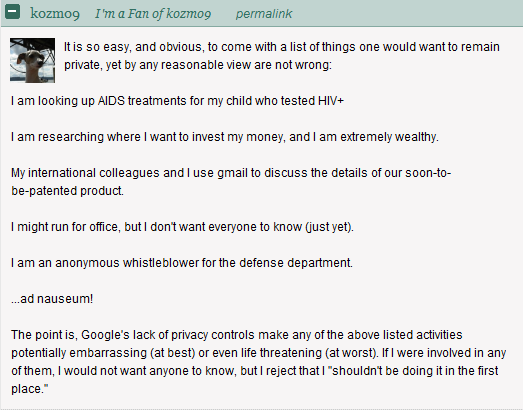
Why does Eric Schmidt dismiss your privacy?
money
Exploiting User Flaws for Maximum Profit Potential
Google collects more data than they need to (putting you at greater risk), so they can better exploit your mental weaknesses for profit. Eric Schmidt is betting big on exploiting YOUR privacy for profit:
Even better, the device knows who I am, what I like, and what I have already read. ...
Some of these stories are part of a monthly subscription package. Some, where the free preview sucks me in, cost a few pennies billed to my account. Others are available at no charge, paid for by advertising. But these ads are not static pitches for products I'd never use. Like the news I am reading, the ads are tailored just for me. Advertisers are willing to shell out a lot of money for this targeting.
But a bet for ads that learn you and profile your faults and weaknesses is not one that Tim Berners-Lee would make. The creator of the WWW is firmly against it:
In a world where democracy is getting more participatory, it's very important that people are informed over a neutral medium so they can connect to whoever they want. Another issue that is very important is snooping. I don't want any snooping on my Internet traffic.
You can do things to ensure that my Internet runs smoothly, but when I am doing something which is perhaps very intimate: when someone looks up something to see if they have cancer, or a teenager wonders if they are homosexual or not and wants to go online to find answers, this should be private. So systems that monitor every click and build a profile of me are very damaging.
The things we do on the Internet are so intimate that they are much more valuable to others and damaging to me than having a permanent TV camera in my living room. I don't want my health premiums to go up if I look up health information; I don't want to be a suspected terrorist if I do research on chemicals, I don't want to get leaflets from gay rights groups if I look up something on sexuality.
At least we know why Eric Schmidt says "Advertisers are willing to shell out a lot of money for this targeting" and why he thinks you don't need to worry about it.
But maybe Mr. Schmidt is right. Lets look at how Google operates...
With Nearly Unlimited Privacy & Secrecy
What happens when Google gets search personalization or search suggestion wrong and your spouse wants to divorce you because of a Google error? Judgment is important, after all. Well Google wouldn't make such errors, they are perfect. Or are they?
Google's Data Privacy Strategy is a Leaky Boat
Google wants you to trust them enough to store your data with them in the cloud. Eric Schmidt said that the cloud was their most important focus in 2010. Well what happens when your internal data is exposed publicly due to a Google bug? Couldn't happen? Well guess again and again.
Is Eric Schmidt suggesting that businesses simply shouldn't consider using Google Apps because Google has a track record of not caring about user privacy & being sloppy with private data? How should we judge Google based on their current business practices? Judgment is important.
Google Promotes Lambasting Content
A few weeks back while watching CNBC I remember seeing reporters mention that if you want customer service from airlines that you should complain on Twitter. Google has since integrated such messages directly in their search results. So now any bad customer experience (or envious competitor) becomes part of your brand. And you can't make money while making everyone happy. As the web gets more competitive the markets will only get nastier, where more people try to cash in on established brands.
In fact, running AdWords ads asking if (or exclaiming that ) product or service x is a scam is one of the most popular AdWords affiliate strategies. Google doesn't let brand advertisers opt out of such messaging on their brands, and if you don't buy your brand they will be glad to sell that ad slot to someone else.
Google AdWords Ads Promote Scams
Sure Google recently sued some scammers who were cashing in on the Google brand directly, but how long was Google running the Obama stimulus and government grants for after they lied and said they were already cleaned up?
What does it say about the Google brand that their own brand is being tarnished, but will run scam ads on other keywords even after they said the issue has been cleaned up?
It is so bad that Google has an ad category called "get rich quick".
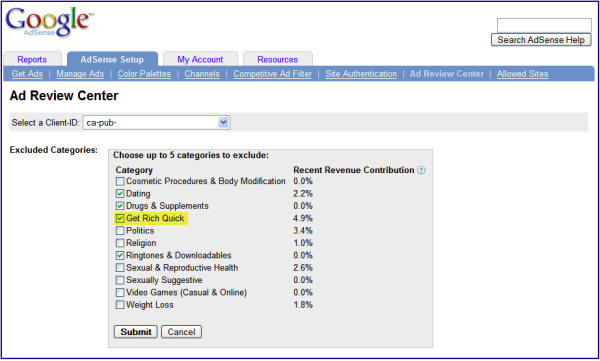
How should we judge Google based on their current business practices? Judgment is important.
Google Recommends Violating Copyright
Most sites violating copyright online which carry ads are wrapped in "Ads from Google", via Google AdSense & Google DoubleClick.
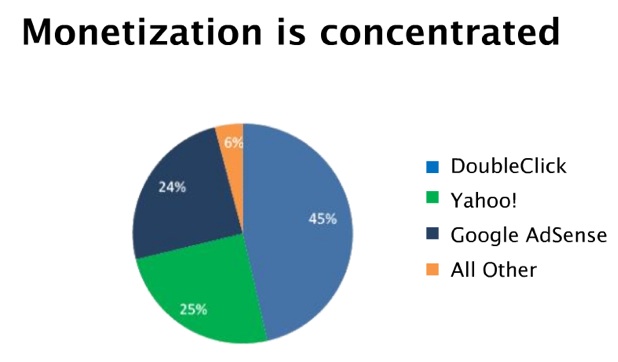
Further, Google also promotes cracks, warez, and torrent searches on copyright materials.

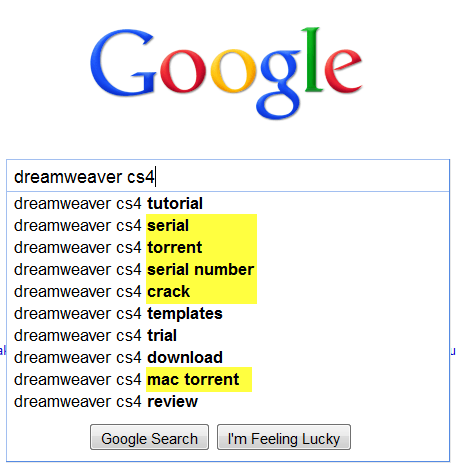
Sure it is not as bad as when Google ran AdSense ads on the #1 cracks website, but how hard would it be to sanitize words like warez and cracks from search suggestions?
How should we judge Google based on their current business practices? Judgment is important.
Google Uses Limited Ad Disclosure
Google has frequently talked up the importance of publishers disclosing ads. And yet in some cases Google removed the "Ads by Google" notification with a little "I" button that you have to scroll over to see that it is an ad.
Further sometimes they have shown NO ad notification on some ad units, making some website visitors think certain site owners condoned homosexual activity.
And Google even marketed the fact that their searchers did not realize that paid search AdWords ads were advertisements:
INT [interviewer]: “Why do the results on top have a yellow background, did you notice?”
TP [tester]: “I didn’t notice this.”
INT: “What does it mean?”
TP: “It definitely means they’re the most relevant.”
Google did not use this feedback to beef up their clearly confusing disclosure...they stuck with what was working well for them.
How should we judge Google based on their current business practices? Judgment is important.
Google Funds Manual Information Pollution
I was looking through some of the suggested article titles for some of the garbitrage websites, and came across gems like "Miley Cyrus Did What? Celebs who Make Bad Decisions and How to Teach our Kids Right"
Could that title be any more leading? And Google is funding that sort of garbage - right now.
How should we judge Google based on their current business practices? Judgment is important.
Google Funds Automated Information Pollution
And there are sites with automated content generation built around arbitraging brands. A few months ago I saw the following automated crap ranking for some of our branded keywords...trying to arbitrage our brand & associate it with foreclosure scams
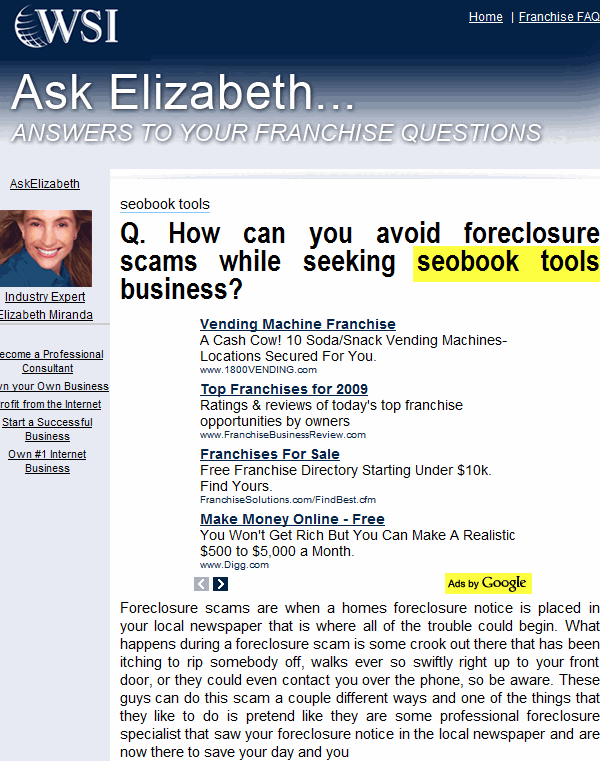
And that was not a 1 off article...Google is paying to have 10,000's of such gems created, and is indexing them with glee

What does it say about the Google brand that their ads support this automated generation of trash? What message does that send to online consumers and business owners? How should we judge Google based on their current business practices? Judgment is important.
Google's Enjoyment of Privacy (aka Black Box Pricing)
Some advertisers have fallen out of grace with Google over the years and have had no luck getting back in. Google arbitrarily decides they don't like them (or maybe even their business model) and that the relationship should end. The game is complicated, but in some cases one strike and you are out. The same sort of privacy and secrecy is core to Google's organic search engine ranking algorithms, how they profile and target certain webmasters, the proprietary standards they push onto the web (like rel=nofollow), & almost every other aspect of their business.
Are you a Google cell phone partner who built a phone on Google's Android OS? If so, did they tell you that they were going to thank you for the cross marketing by creating a competing product? I doubt it.
Are you a Google partner who syndicates their ads? Want to know what percent of the click price you are earning? Screw you, you can't. Go eat crow.
And in the markets where Google is dominant they not only pass arbitrary judgment without care, concern, or explanation...but they also use their market position to exert monopoly pricing powers. They frequently state that the market sets the prices on the ads, but for one of our sites we did some brand ads on informational searches where there are no competing sites buying AdWords ads.
Our ad is so relevant that even the broad matched version of the ad is pulling in a 12%+ clickthrough rate (with phrase match more than doubling that clickthrough rate). Searchers love our ad and website. But if we bid less than a nickel Google won't even display the ad (in spite of the high relevancy and complete lack of competition in the marketplace).

Google sets arbitrary floor prices and shows you that if you want more clicks you need to pay more, even though the only competitor in this auction is Google. It is no better than the shill bidding SnapNames got in trouble for.
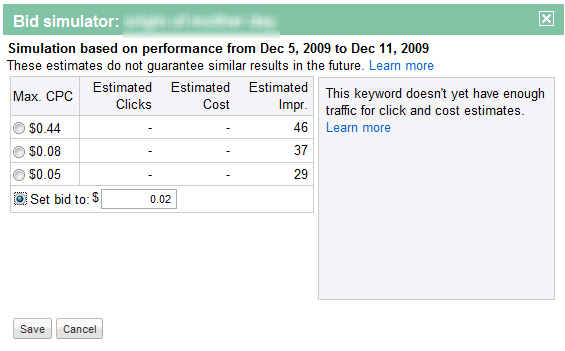
And yet you often hear Google talk about the power of democratic marketplaces. Something they clearly don't believe in. What message does that send to business owners? How should we judge Google based on their current business practices? Judgment is important.
What is YOUR Judgment on Google?
Anytime you see Google do something stupid make sure you blog about how stupid Google is, and compare their errors to what sort of results are available on Microsoft Bing. Feel free to leave your examples in the comments AND blog them. I'll share one of my favorite examples from today, showing me New York hotels near San Francisco :D
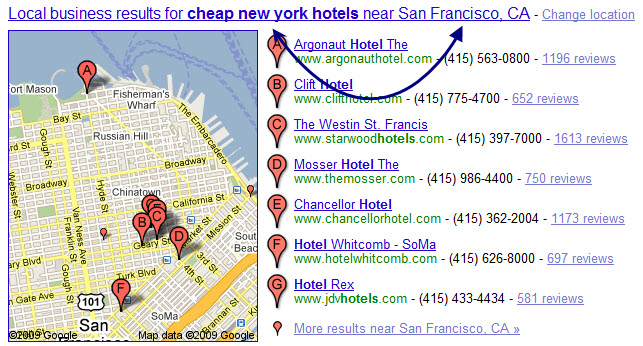
I still use a lot of Google products and write the above knowing that they have been pretty good to me, but seeing nonsensical garbage absolutist statements from the top of their company scares me.
If Privacy is Unimportant...
Think I am being hard on Google? Well if they think privacy is unimportant, then maybe they can explain why they host a PDF titled Inside the Black Box Technology and Innovation at Google.
Google workers think THEIR own privacy is crucial to their success (and WILL fire any employees who get it wrong), but think YOUR privacy is a commodity they should sell to the highest bidder.
Good to know!
Careful what you enter into a search box. And be careful when choosing your web browser. I would rather pay $50 more upfront and not get spied on. How about you?

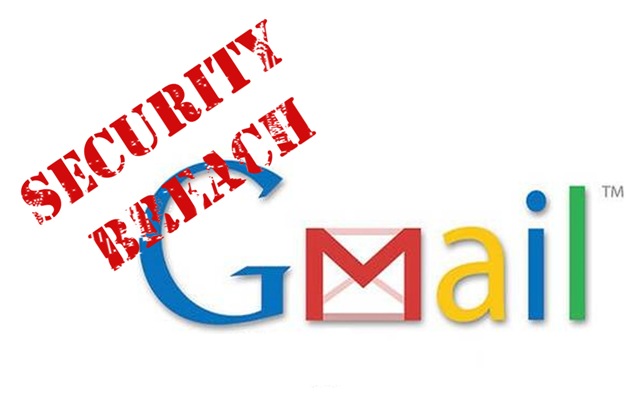
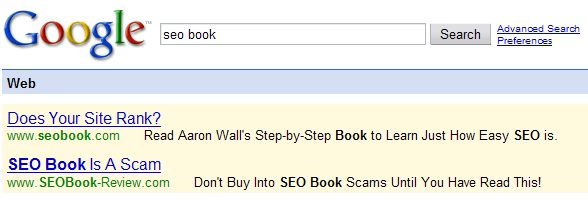



Comments
Wow. Good rant. How personalized is too personalized regarding behavioral data mining and targeting? If Google could read my mind and project my thoughts onto my laptop screen in the form of ppc ads, Schmidt might quote Matthew 5:27 and I might think him a religious man.
...I don't think quality and relevance necessarily require the level of personalization Google has crossed into. On the contrary, people are perfectly capable of adapting to and using a search tool. And it isn't personalization if I haven't willfully done anything to make it my own; it's deep behavioral modeling & targeting.
I find the Gmail thing somewhat disturbing, but imagine that Facebook and Twitter will soom cross that creepy line. Noteworthy, Schmidt made a statement regarding social media's low(er that search's) profitability a while back that makes me wonder why they're insistent on targeting my email content and storing my deleted communications almost indefinitely.
... The fact that Schmidt makes reference to the Patriot Act more than implies a partnership between his company and the government, which is likely why Google has managed to skirt some privacy legislation. NSA, Area 51, FBI, CIA, Interpol, ... Eagle Eye artificially intelligent risk-assessing being... or something. Ha. Nevermind.
Well said, Aaron!
With Eric Schmidts latest statement in mind I think it should be safe and totally legit to start posting pictures of pot smoking Google employees, publish recordings of private conversations, the results of "shoulder surfing" them in public, pictures taken through their private windows and over their fences (like Street View does), pictures of their kids, their schools, lovers, car plates, habits and more ...
After all... "If you have something that you don't want anyone to know, maybe you shouldn't be doing it in the first place." - such as, having kids, having sex, enjoying life and talking about private stuff with others ...
It must be nice to have such a big company with only perfect people that have absolutely no secrets and nothing they want to keep private. I am sure none of them have secret lovers, drive to fast, smoke pot or missbehave in public in any way or shape ... right?
We will be covering this topic in more details on tomorrows edition of Strikepoint at WebmasterRadio.FM ... Who knows what we may broadcast ... :)
Wow Aaron, that was a gutsy post. And in doing so you've provided me a platform.
You wrote in one place: "Some advertisers have fallen out of grace with Google over the years and have had no luck getting back in."
2 weeks ago Google informed me without prior warning or any sort of caution that they had permanently disabled my AdWords account and said they'll never allow me back into the network. In shock I asked them nicely (1) to detail in what way any of my ads had violated their landing page guidelines, and (2) how to get my balance refunded.
Archana from the AdWords Team replied:
"Please note that our support team is unable to help you with this issue, and we ask that you do not contact them about this matter."
So, no details, and no refund of MY MONEY they apparently get to keep/steal. If that's not a total and arbitrary abuse of power, tell me what it is.
Keep at the low life's.
Stew
Wonder how much they'd enjoy someone publishing all their personal info along with the job position and title at Google?
Say:
Bankruptcies, Tax Liens, Judgments, Defaults, UCC Filings, Corporations, Full Name, Address, Address history, Date of Birth, Social Security Number, Relatives and on and on and on...
Wonder what their response to that site would be?
I saw the interview with Eric Schmidt. I about fell off my chair when he said, "Judgment is important ... If you have something that you don't want anyone to know, maybe you shouldn't be doing it in the first place."
Just reading it here has my blood boiling again. What an idiot! I've been wanting to rant about this but I'm so upset thinking about it again now I may have to come back and comment when I can be a little more coherent.
Thanks for an absolutely great post!
This post is a great reminder about the importance of privacy.
Dave Davies, CEO
Beanstalk SEO
I agree it isnt exactly hard to come up with reasons where this strange little phrase about not being supposed to do it in the first place is completely silly.
It's actually not about just "doing" things, but also about "being" a certain way (people who are gay but don't want everyone to know, people who have psychological disorders but dont want everyone to know, etc.).
When I heard about that quote it made me wonder:
Why in the world would the guy say something like that? I mean the guy isn't utterly stupid, I'd assume so he obviously knows these things himself, but why does he make a statement like that? Only explanation for someone to say something like that I can imagine would be to get people to talk about it lol (but then again that doesnt really make snese here, I guess). Why in the world did he say that?
Could people getting scared about their privacy & Google cost google some serious market share? I assume only far into the future hm?
Regarding usage, I was just reading an old Guy Kawasaki book where he posits that you DON'T want to design for the geeks. Because they'll keep asking for more features and no one else will use them. (TBH, I've been using MS Word for about a decade and I still don't use more than the main functions, so I'm more of a mind with Kawasaki.)
"INT [interviewer]: “Why do the results on top have a yellow background, did you notice?”
TP [tester]: “I didn’t notice this.”
INT: “What does it mean?”
TP: “It definitely means they’re the most relevant.”"
That's fasinating! Seriously, that's striking... [Not being sarcastic here.]
Regarding Schmidt's line, I watched the original interview and I think you're misquoting that. While government excesses are possible and do happen, it's understandable that Google should keep this data as per the Patriot Act's requirements. If someone looks up how to make a bomb, yeah, I'd be fine with the government knowing who that was so as to check out his background etc.
I think Schmidt's point wasn't that people can't have secrets or things they want to keep to themselves. He was talking more in the moral sense of the famous "newspaper test." The question is, "would you feel comfortable if what you did was on the front page of tomorrow's paper?" If you're a terrorist planning to kill people, maybe you shouldn't be doing that.
That said, I'm not naive and I'm sure Google is mining its data in attempts to personalize ads and maybe get big government healthcare contracts. Some of the problems you point out I agree with, eg the quote on HIV. But if I search for a car and then Google retargets me on the content network with car ads, it wouldn't really bother me. It's a question of the sensitivity of the information - not all personalization is bad.
I agree in a sense that it's not a big deal most of the time. If I am searching for cars I don't mind if content network matches up those ads.
With that said, I think the biggest problem is the lack of education of its users. I guarantee that most people searching Google or using their services have no idea the extent of the data being collected. They have no idea it's being stored forever and that it's being used to create profiles based on their searches. Sure it's being mentioned in the fine print of their terms of service, but no one is going through and reading that.
If people knew what was being collected on them and that there is always the possibility of that information somehow getting into the wrong hands, would they still use Google as much?
Google keeps more data than they need to in order to further improve their profit margins by exploiting your personal flaws with enhanced ad targeting.
For them to claim that government retention is the only thing to worry about is to simply skip past / bypass / ignore their entire business model.
And the problem with giving them a pass off the start with add targeting is that nobody knows how far they will take it.
The one thing that *is* clear is that the guidelines they suggest for others and how they run their own business have nothing to do with one another. ;)
Fair points, those, and ones I agree with. You're not really responding to what I said in defence of Google's CEO though...
I wonder what Google feels about people who use Google products, but who NEVER click on their ads? I'm one of those people. I think I'm in a big majority too. I've read in many places that a small minority click on the majority of ads.
What about those who use AdBlock? What do Google think about them?
What actually worries me is if I start clicking on Google ads - it's like I'm waking the monster - they'll direct their scanning beams in my direction as my behaviours are suddenly all that more important now that my clicks are making them money. Suddenly I'm a "clicker" and they want me to click more. If I never click, and I mean NEVER, they know they can't convince me to click.
Also I've still yet to see truly relevant ads on pages - Adsense is still a joke when it comes to relevancy - whether I'm logged in or out of my Google account.
But I totally agree that Schmidt dropped a clanger here - and I read on techcrunch Matt Cutts saying "oh no, that's out of context, he was talking about privacy in terms of the Patriot Act and terrorism". Actually Matt, that makes it worse. It means Google's making a lame excuse to spy on us like a politician uses a lame excuse to spy on us.
With AdSense I have seen sites that have a 10%+ clickthrough rate (on a per page basis with the CTR/visitor being 30%+)...so I wouldn't call that ad targeting a joke.
The small minority of people clicking the majority of ad clicks is true for display ads (where it is obvious that the ad is an ad), but the same is *not* true for search. See the above referenced study about how the average searcher could not distinguish between the paid ads and organic search results.
I am a publisher with Adsense on many websites and I've found cerain verticals are way more successful than others when it comes to ad matching and CTR. Or in other words, certain verticals perform very poorly due to bad ad matching.
Where it's bad - on certain verticals that can be quite demanding when it comes to matching, like ticket selling. Adsense can throw up totally irrelevant ticket ads e.g. when a page is listing a music festival and tickets available for it, Google throws up baseball ticket ads, London ZOO ticket ads (I guess because the event mentions it's near London?) etc. The page is on-page optimized with sensible HTML title, H1 tag etc all with relevant keywords about the music festival.
An intelligent ad system would recognise the music festival and list other ticket sellers for that festival, or similar festivals in the geolocation of the web visitor, or even ads related to bands appearing in the festival. Not baseball or London zoo tickets (where matching seems to be limited simply to keyword score). I know that's just one example, but I've seen this happen a lot. Imagine if Google's SERPs were that bad....
It could be they lack the ad inventory in that area (shocking if true) but it just seems like they make big mistakes in ad matching many times on Adsense. I think that's disguised in other verticals where poor matching is less obvious than tickets.
I don't like google and cheer on every sceptical article about them but it's a tad hypocritical to write this and then run google analytics on the same page. Don't want big brother to watch over your shoulder? Do something about it yourself first. Go use Piwik or whatver to analyse your visitors and stop denying your own responsibility in all of this please.
Most of our websites don't run Google Analytics. And eventually this site will not either.
Add new comment